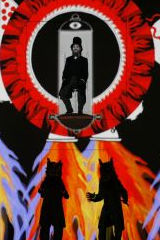A bold new future for Opera Philadelphia
by Steve Cohen
 Starting in September 2017 the company will produce a 12-day festival each year, with innovative productions in multiple locations. Billing the first one as O17, Opera Philadelphia has planned seven happenings between September 14 and 25, 2017.
Starting in September 2017 the company will produce a 12-day festival each year, with innovative productions in multiple locations. Billing the first one as O17, Opera Philadelphia has planned seven happenings between September 14 and 25, 2017.
A modern Magic Flute by Mozart that uses cartoon bubbles instead of spoken recitative is being imported from the Komische Oper in Berlin and will be performed in the Academy of Music. A new chamber opera, Elizabeth Cree, by the composer and librettist of the successful Silent Night, Kevin Puts and Mark Campbell, will use the smaller Perelman Theater.
A double-bill of Monteverdi’s Il Combattimento di Tancredi e Clorinda and a new work composed by Lembit Beecher, using the same instrumentation as Monteverdi, will be presented on the grand interior staircase of the Philadelphia Museum of Art. Combattimento is set during the First Crusade when Christians fought Muslims, and Beecher’s piece will share that earlier opera’s war-like theme.
A new composition for voice is in development for performance inside the Barnes Foundation. Since that museum is a superb repository for Impressionist and post-Impressionist art, expect music of that type.
A hip-hop musical, directed by Broadway’s Bill T. Jones, will be produced at the Wilma Theater on South Broad Street. Traditionalists shouldn’t be afraid of that genre. Lin-Manuel Miranda, after all, uses rap and hip hop elements in his immensely crowd-pleasing Hamilton and In the Heights.
An added attraction during that 12-day span will be a recital and a master class by leading soprano Sondra Radvanovsky. There’s talk that she will appear here in an opera at a later date.
That period will be buzzing with activity in all the venues and Philadelphia tourism agencies are excited about an expected influx of visitors during the festival.
Admirably, the company seems focused on artistic merit rather than box office. Some of the new venues can not accommodate large audiences. The Art Museum staircase and its balcony can seat no more than 300 people. The Barnes Gallery would hold even fewer. I’m pleased that Opera Philly is aiming for artistry ahead of ticket sales.
The idea of concentrated “festivals” has been growing among opera companies. Vancouver and Wilmington just announced that they are switching to that format. Those organizations took that path because of financial problems. Vancouver says that it will save money by not having to maintain a year-round staff. They plan seasonal hiring and “a concentration of marketing expenses to a single festival-style campaign.”
That’s not the case in Philadelphia. Rather, this is a pre-emptive move. Opera Philly’s chairman, Daniel Meyer, said that research indicated an erosion of attendance unless younger patrons could be attracted to replace older ones as they die off. It’s not that attendance is dropping yet, but that planners expect it will unless the company gets ahead of the demographic curve.
David Devan, Opera Philadelphia’s general director and president, disclosed a portion of the results of a survey that reported 27% of the company’s single-ticket buyers were between the ages of 25 and 34. He says this is the largest category, at least for single-ticket purchases. It would be nice to see the whole survey and discover details about subscribers versus occasional patrons, and all the varied age, ethnic and economic groups.
Despite the absence of details, it appears that programs will be aimed at young people. Yet the 2017 festival looks appealing to music lovers of any age. And, unlike Vancouver, Wilmington, Fort Worth and Cincinnati, there still will be a regular season after the excitement of the brief festival.
But how much of a season? This month’s press conference disclosed that three operas, yet un-named, will be staged in the Spring of 2018. There’s concern about momentum and continuity. How will Opera Philadelphia fans get their musical fix during the five month gap in the fall and winter?
Those other cities are planning recitals by young artists. That might seem exciting in their places. But Philly has plenty of recitals already, plus opera productions by the AVA, Curtis, Temple University and more. So we wonder how this company will maintain interest year-round.
Opera lovers are used to a routine of Met radio broadcasts every Saturday, Met HD telecasts to cinemas at least once a month, and they’re aware that the Philadelphia Orchestra has regular concerts every weekend. Fans used to expect Philadelphia operas about once a month.
These audiences span all ages. Seniors line up early, with bagged lunches, to pack the movie theaters; teenagers stand in line at the Kimmel Center for rush tickets to the orchestra concerts.
Regularity translates into loyalty, and a subscription series provides a financial cushion for any company. Clearly, no one wants to abandon those devotees. Their involvement should be treasured and they need to be reassured that they won’t be abandoned.
Photo © Robert Millard